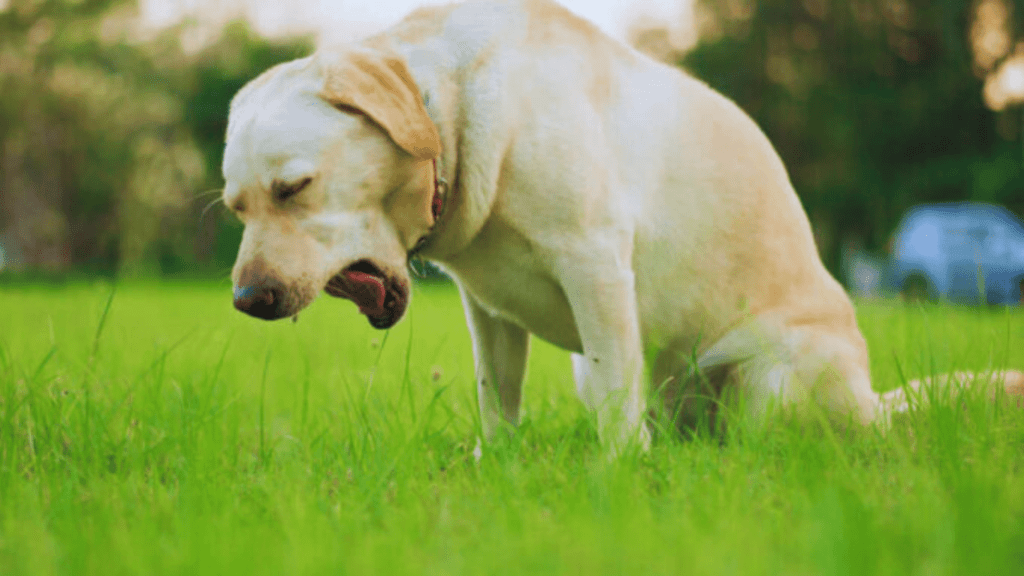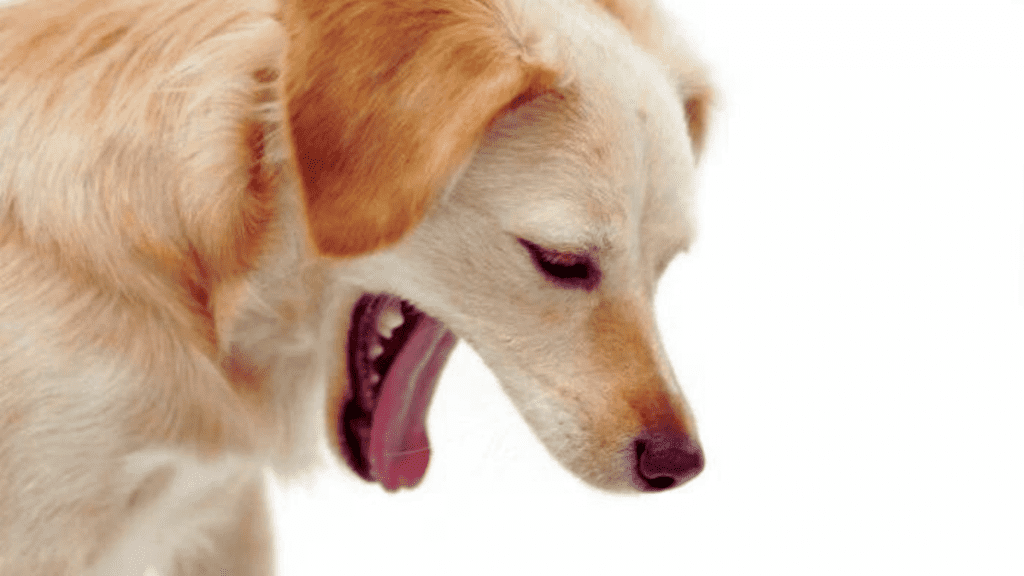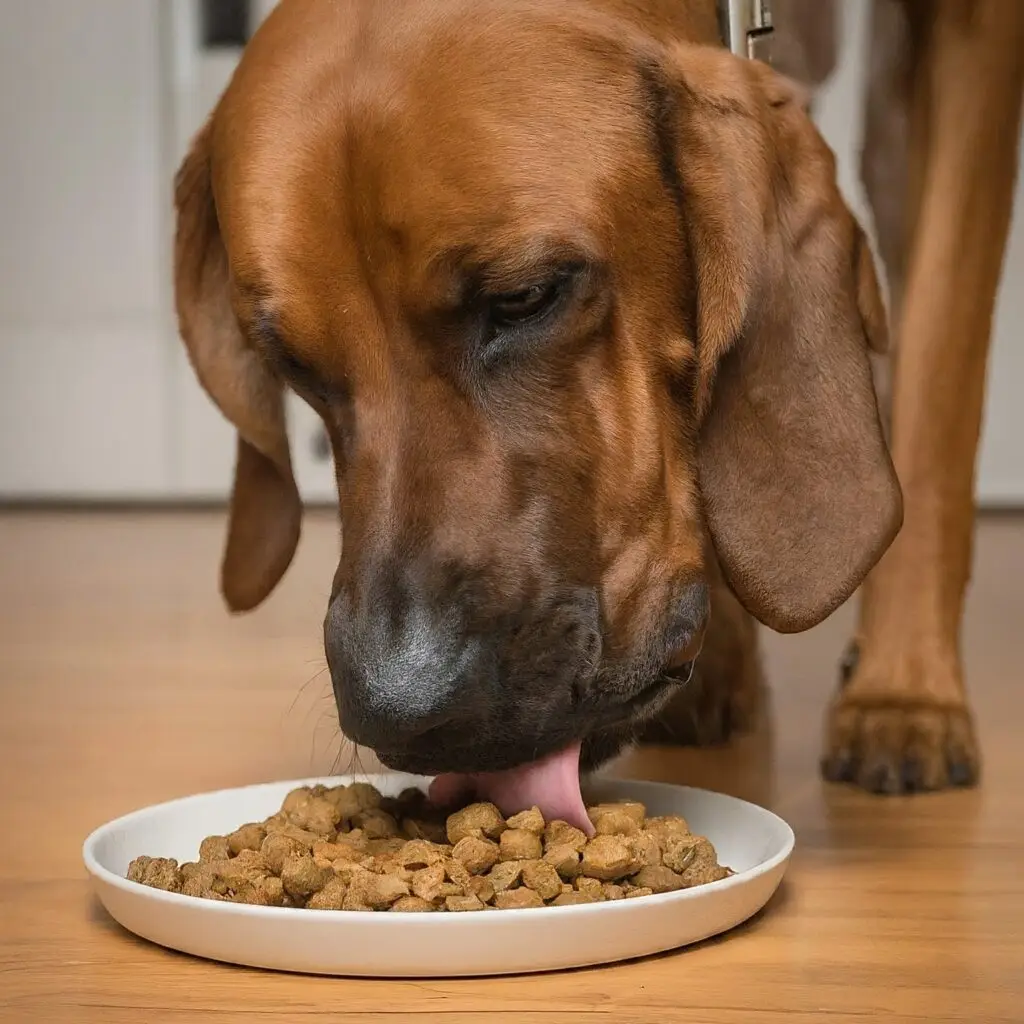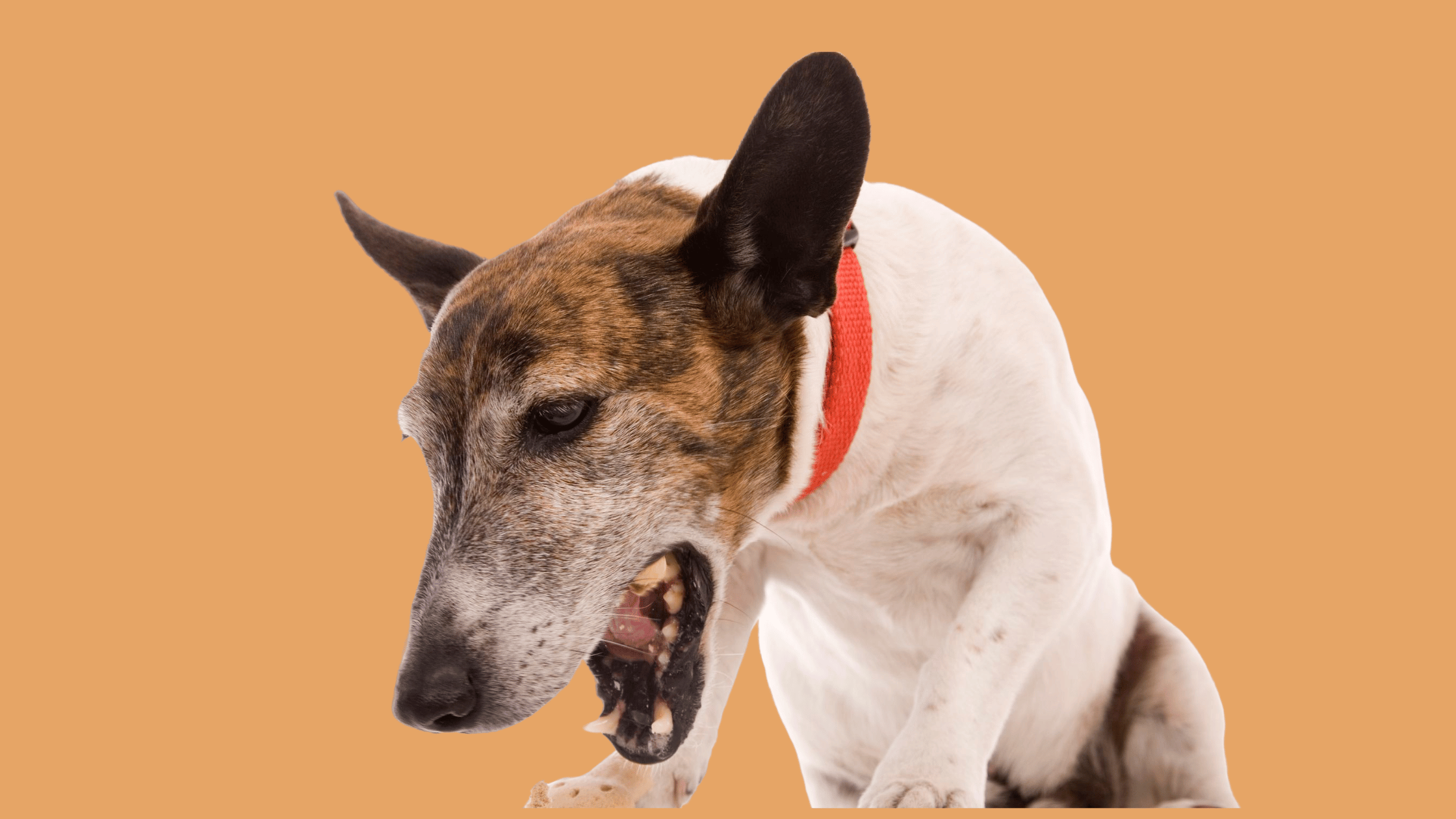Do you want to know why your dog is dry-heaving but acting normally? Didn’t you know the solution?
Seeing your dog showing signs that it might vomit but then doesn’t is weird. Taking care of your dog and figuring out what’s happening with them is extremely important.
This includes understanding why your dog might be dry heaving. It’s primarily focused on showing you how to look out for them. You may be doubtful that something as odd as dry heaving could mean significant trouble, but it’s true.
Sometimes, it’s nothing major, but other times, it could be shouting that something terrible is happening inside.
For instance, research shows that dry heaving might be linked to severe conditions like Gastric Dilatation-Volvulus (GDV), where the stomach twists and fills with gas, requiring immediate veterinary attention (Journal of the American Veterinary Medical Association, 2018).
Other studies highlight esophageal disorders and foreign body obstructions as potential causes of dry heaving, emphasizing the need for accurate diagnosis and timely intervention (Veterinary Surgery, 2019; Journal of Small Animal Practice, 2020).
If your dog does it once in a blue moon, don’t bristle.
But if your dog has a lot of dry heaving more often or it doesn’t look good, that could be a sign that it’s not very healthy. This means it has health issues brewing and needs a pro to check them out.
We will delve into why dogs do this weird heaving when you should start worrying and give you some tips on dealing with your fuzzy friend’s throwing-up problem.
Getting the complete picture of this makes a difference in keeping your dog happy and healthy.
What Is Dry Heaving in Dogs?

When dogs dry heave, they are going through the motions of throwing up without actually bringing anything up.
It looks as though they want to vomit, yet nothing comes out, leaving pet owners scratching their heads or getting worried.
All sorts of material can spark dry heaves in dogs. Finding strength in the face of an empty stomach vomiting, pet owners might wonder what’s happening with their furry friends.
What Causes Dry Heaves Without Vomiting?
Understanding why dogs dry heave and don’t vomit is a complex issue with many potential causes, from minor irritants to severe dog health conditions that require immediate veterinary attention.
For example, something as simple as throat irritation from dust, pollen, or smoke can make dogs try to clear their throat with dry heaving, which usually stops once their throat feels better.
Then, there are times when dogs act on their curiosity and accidentally eat small items such as toy components, sticks, or bones. If something gets stuck, they’ll dry heave, trying to kick it out, maybe even coughing or drooling along the way.
Gastrointestinal issues aren’t fun for anyone, not even dogs. When their tummy rebels with acid reflux, bloating, or a mild upset, they can also try to throw up without success.
Dry heaving can also be caused by breathing troubles caused by kennel cough or other sicknesses, including some coughs or wheezes.
A scarier trigger is bloat, officially known as gastric dilatation-volvulus (GDV). This rare yet intense condition causes the Dog’s stomach to twist, trapping gas, blocking vomit paths, and causing dry heaving. This warning sign needs speedy vet check-ins.
Differentiation Between Dry Heaving and Vomiting
Understanding the difference between your Dog’s dry heaving and throwing up is extremely important because these actions indicate different health phenomena.
When a dog throws up, it pushes out what’s in its stomach, usually after it feels sick from eating the wrong thing.
Dry heaving is different because nothing comes out even though your Dog looks like they’re trying to vomit.
Vomiting is sometimes just what happens if your Dog ate something they shouldn’t have, or in a fundamental essence, their body is just reacting, but if your Dog is trying to vomit.
Nothing’s coming up; it might be because something’s not right, like maybe something’s stuck in their throat.
That’s why if your Dog keeps dry heaving frequently or seems upset, you should probably take it to the vet to ensure it’s nothing serious. You want to check that no more significant problem is causing it.
Why is My Dog Dry Heaving But Not Throwing Up?
For a short moment, it might seem that a dog trying to vomit but only managing to dry heave isn’t a significant issue.
However, it can sometimes indicate something much more severe, preventing them from getting rid of whatever’s in their stomach. The material inside can range from minor issues to severe problems.
Possible Causes of Dry Heaving:
- Bloat (GDV – Gastric Dilatation-Volvulus):
- The stomach becomes bloated with gas and twists around, trapping the gas and cutting off blood flow.
- This is a significant emergency that can be fatal if not treated quickly.
- The Dog will keep trying to throw up, but nothing comes out.
- Obstruction:
- Something might be stuck in their throat or esophagus.
- Dogs often chew on things they shouldn’t, causing objects to get stuck, which might require surgery.
- Infections:
- Infections like kennel cough can irritate the throat and respiratory tract.
- If your Dog coughs frequently or struggles to breathe, it might be due to an infection, and you need to see a vet.
- Stomach Issues:
- Acid reflux or a mild stomach bug can cause dry heaving.
- If the problem persists, a vet visit is recommended.
A dog trying hard to vomit but failing can signal various problems, such as:
- Digestive issues
- Foreign objects
- Respiratory infections
All of these require a professional evaluation to ensure your Dog’s health and safety.
Why is My Dog Trying to Throw Up But Can’t?
When your Dog keeps trying to throw up, but nothing happens, don’t brush it off. This could be a significant red flag for serious health problems requiring an urgent vet trip. Here are some possible causes:
Bloat (Gastric Dilatation-Volvulus):
- This occurs when your Dog’s stomach fills with gas and twists, causing severe swelling.
- Symptoms include dry heaving, a bloated belly, and visible discomfort. If your Dog shows these signs, get emergency help immediately.
Obstructions:
- Sometimes, something blocks your Dog’s digestive tract, preventing them from vomiting correctly.
- This could be a foreign object or material causing a complete blockage. Urgent veterinary care is necessary if your Dog repeatedly tries to heave, but nothing comes out.
Torsion or Volvulus:
- Similar to bloat, these conditions involve twisting or rotating the intestines, causing severe pain and discomfort.
- If your Dog is distressed and unable to vomit, these issues might be the cause, requiring immediate veterinary attention.
General Gastrointestinal Issues:
- While occasional dry heaving may not be severe, persistent symptoms should not be ignored.
- Severe internal blockages or other significant problems can be life-threatening and need prompt attention.
Every second counts when dealing with these issues. If your Dog shows severe discomfort or repeated dry heaving, be sure to seek professional help.
What to Do When Your Dog is Dry Heaving?

You might jump to conclusions when your dog starts dry heaving, but it could mean several different things.
Sometimes, it’s just a minor tummy problem, like indigestion or acid reflux. However, in what you may think is a stark contrast, it can also be serious, involving bloat or breathing troubles.
Spotting the exact reason requires watching your dog closely and might need a vet to check them out.
If your dog is trying to heave but nothing is coming out, here’s a list of which steps to follow:
Keep an eye on your dog. Notice how often and how severe the dry heaving gets.
Also, look for other odd phenomena, such as if they’re exhausted, their belly is puffing up, or they’re not hungry. Think about what’s different lately.
Has their appearance changed, or did they swallow something unusual? Stress can do it, too. Make sure they’re not getting into anything wrong.
Helping them feel better could be as simple as giving them easy-to-digest food, such as chicken boiled without flavor and some rice—and ensuring they drink plenty of water.
But if your dog’s dry heaving doesn’t stop, it’s severe, or it shows other scary symptoms, tell the vet right away.
Especially if it looks like bloat, something is trapped inside them, or they can’t breathe well, which is an emergency.
Senior Dog is Dry Heaving But Acting Normal
When your senior Dog is dry-heaving but still appears normal and healthy, it could be a sign of age-related health issues. As dogs age, their immune systems weaken, making them more prone to illnesses that can cause dry heaving.
Older dogs might suffer from colds or stomach pain that affect them more than younger dogs. They can also experience ongoing health problems like sore joints, kidney issues, or diabetes, which can lead to nausea or stomach upset that causes dry heaving.
Additionally, the muscles involved in vomiting can weaken with age, causing your Dog to try to vomit without success.
Dental issues can also be a factor. Poor dental health, such as bad teeth or gum disease, can lead to nausea and discomfort, prompting dry heaving. Checking your Dog’s mouth might help identify this issue.
Finally, medications that older dogs take for various conditions can sometimes upset their stomachs, contributing to dry heaving.
If your senior Dog is dry heaving without vomiting, it could indicate these underlying problems. Monitoring their health closely and consulting your vet to address potential issues is essential.
Puppy Dry Heaving
When puppies act differently or aren’t well, they require special care compared to larger dogs. Their transition from mom’s milk to solid food isn’t always smooth, and eating new items too quickly can upset their stomachs. Vets recommend introducing new food gradually to help them adjust.
As puppies grow, their bodies constantly develop. This means their digestion and immune systems might not be fully functional, making them more ill-prone. Puppies need ongoing care and attention as they learn and grow.
Puppies might chew on things they shouldn’t, such as small toy pieces or random objects, which can cause throat irritation or blockages. Additionally, they’re building their defenses against germs and illnesses.
Puppies can also catch illnesses like parvovirus, which affects their digestion and can lead to constant dry heaving without vomiting. A vet visit is essential if your puppy is persistently dry heaving, acting tired, or has diarrhea. Teething can also cause discomfort and upset their digestion.
Regular vet visits and timely worming medications are crucial for maintaining puppy health. Even minor issues with their diet or exposure to bugs can lead to significant problems.
Pet owners can help their puppies through this vulnerable stage of life by being proactive and providing the necessary care.
Dog Dry Heaving and Eating Grass
When your Dog does that weird thing, like trying to cough without anything coming out, keeping an eye out for what’s occurring beforehand can tell us why this is happening, especially when they start chewing on grass.
Dogs hit the grass for many reasons; it could be that their belly hurts or they’re trying to throw up something terrible.
If your pet starts throwing up things you can’t see, eating grass is the vital clue. It is apparent to you and me that checking if the grass eating is hurting their stomach and causing the dry heaves is an intelligent and informed move.
Linking their eating habits with things that aren’t things can help you figure out the problems your pet is dealing with.
Seeing the picture laying out the facts about when the dry heaves hit can steer us right into completing the issue, even spinning around our understanding of what’s tipping the scales toward their moments.
Dog Dry Heaving on an Empty Stomach
When your Dog is dry-heaving and hasn’t eaten, it does that for several reasons. If it hasn’t eaten for a while or has been eating at odd times, its stomach becomes irritated because of the extra stomach acids; this causes it to start dry-heaving.
The path to discovery and discernment is figuring out why your Dog is acting this way.
Another reason could be that they’re just starving. Just as we feel when we’re hungry, dogs can, too; their stomach acting up without food for too long can make them start dry heaving.
Also, there are those dogs with stomachs that can’t handle much. If they don’t eat, the lack of food makes their stomach issues even worse, which can cause them to start dry heaving.
Knowing what sets off this behavior is extremely important. It helps you figure out what’s happening with your Dog and what you can do to help.
But if your Dog keeps dry heaving even after you try to fix these things, or if it starts showing other worrying signs, you must take it to the animal doctor.
They can tell you if it’s something more serious and tell you what to do to ensure your Dog starts feeling better.
Home Remedies for Dog Dry Heaving

If your Dog starts dry heaving, you might try some home remedies that are comfortable, safe, and could help your pet feel better.
However, knowing when these remedies are appropriate and when you need to see the vet is crucial. Here are some things you can try to help your Dog:
Probiotics: Adding probiotics to your Dog’s meals can be beneficial. These good bacteria help maintain gut health and alleviate stomach issues, leading to less gastrointestinal upset. Make sure to choose probiotics specifically formulated for dogs.
Digestive Enzymes: These supplements help break down food more efficiently. If your Dog’s digestion isn’t working correctly, digestive enzymes might help improve it and reduce dry heaving.
Plain Pumpkin: Spoon a bit of plain, cooked pumpkin onto your Dog’s food. Pumpkin is known to help normalize bowel movements and soothe the stomach. Be sure to use plain pumpkin and not the spiced pie variety.
Boiled Chicken and Rice: A bland diet of boiled chicken and rice is gentle on your Dog’s stomach and may help reduce discomfort. Avoid adding any spices or extras.
Bone Broth: This nutritious broth keeps your Dog hydrated and is gentle on their stomach. Adding some bone broth to their food when they’re feeling unwell might help them feel better.
These home remedies can provide relief, but be sure to know when to seek professional help. If the problem persists or worsens, a vet visit is essential for proper diagnosis and treatment.
Guidelines on When to Try Home Remedies
If your Dog’s dry heaving hasn’t been happening for long and is nothing serious, it makes sense to look at some safe home remedies first.
Unsurprisingly, when the cause might be something not too strange with health and everything else about your Dog seems normal, beginning with simple fixes at home is okay.
Say your Dog had something different to eat not too long ago, or you’ve experimented with their diet; then a simple, gentle diet, and maybe some probiotics, could sort out any mild stomach issues because of that.
If the dry heaving issue is rare and doesn’t have worrying symptoms, trying some easy remedies at home could be acceptable.
Just ensure it’s not happening often, and your Dog is all good otherwise.
When to Seek Veterinary Care
So we turn to the topic of when you should start worrying about your Dog dry heaving and think, I need to start checking the phone.
Firstly, if your Dog can’t seem to stop dry heaving as it happens over and over again, or it looks awful, or, in a fundamental essence, if they’re just not their usual self because they’re also exhausted, running to the bathroom all the time, throwing up, or their tummy looks somewhat swollen it’s time to go to your vet.
And say your Dog looks like its stomach might be hurting it, like it’s bigger than usual, or it just can’t sit still and seems really out of it; that could mean something terrible like it’s eaten something it shouldn’t have, and it’s blocking everything up, or there’s bloat. We are looking at significant emergency undercurrents and very bad.
Now, for dogs that already have several trips to the vet because of something such as always having a sore stomach or needing pills, it’s a solid plan to discuss with the vet before you go down the home remedy path on YouTube just because they’ve got the need-to-know material about your Dog’s health history.
Common Misconceptions About Dry Heaving in Dogs
Understanding dry heaving in dogs is critical for proper care. Here, we debunk some myths to help you make informed decisions:
Myth 1: “Dry heaving isn’t serious if the dog seems fine.”
Reality: A dog might look okay during dry heaving but can signal serious issues like bloat or obstruction. Persistent or severe dry heaving requires veterinary evaluation.
Myth 2: “It’s normal for dogs to dry heave occasionally.”
Reality: While occasional dry heaving might be due to minor issues, regular or frequent occurrences suggest more significant health problems. A vet should check persistent cases.
Myth 3: “Dry heaving only happens if a dog has eaten something bad.”
Reality: Dry heaving can result from various conditions like acid reflux, gastrointestinal disorders, or stress, not just from eating something inappropriate.
Myth 4: “Home remedies will always resolve the issue.”
Reality: Home remedies may help with mild cases, but persistent or severe dry heaving needs veterinary attention to ensure proper diagnosis and treatment.
Myth 5: “Dry heaving is always a sign of an emergency.”
Reality: Dry heaving can indicate a serious condition but isn’t always an emergency. Assess the frequency and severity to decide if immediate veterinary care is needed.
What Vets Want You to Know
Tips from the Experts. Actions Your Dog Takes That You Might Not Think
Sometimes, when dogs are dry heaving, they also show other symptoms that someone might not take seriously but could be significant. These things can be material, like differences in your Dog’s actions.
Suppose your Dog seems sleepier or grumpier than usual. In that case, it might be a marker of a more significant health issue leading to dry heaving.
When a dog doesn’t want to eat as much or has trouble consuming it, it may indicate some serious stomach problems behind the dry heaving.
Stomach Troubles Showing as Behavior: Note if your Dog is pacing around a lot, crying, or if its belly looks swollen. These could be signs of pain in the belly area, along with dry heaving.
Don’t Simply Ignore If Your Dog Is Dry Heaving
Dry heaving might seem harmless if that’s all happening, but it can signal significant health problems. Continuing to dry heave can show some deplorable conditions, such as:
A scary thing called Gastric Torsion (also known as Bloat). Bloat is extremely dangerous and must be treated immediately, or things could worsen quickly.
If your Dog eats something that gets stuck inside, it could seriously harm it and cause it to act out like it’s trying to vomit.
Sometimes, the real cause behind dry heaving could be an issue with breathing or a bug they caught. Even if it looks like your Dog is mostly, these signs, including dry heaving, are a heads-up that there could be something more going on.
How to Reduce the Risk of Dry Heaving
In our pursuit to demystify how to stop dogs from dry heaving, it’s vital to keep their eating habits steady and healthy. To avoid upset stomachs, you must ensure the food matches their needs.
Keep them from grabbing and eating items they shouldn’t be keeping small things they may potentially snack on far away, and watch them closely during playtime.
Boosting their belly health is also extremely important, so add probiotics and digestive helpers to their diet and always have fresh water ready. Suppose your Dog behaves strangely after eating certain things. In that case, it may be allergic or susceptible, so change its food to avoid any troublesome ingredients.
Besides the food, getting them plenty of exercise and keeping things calm at home can help avoid stomach troubles.
Don’t neglect to take your furry friend to the vet regularly—it’s essential for monitoring their health and fixing issues before they become huge problems.
If, even after all this, your Dog’s still hacking without bringing anything up, take it to the animal doctor to figure out what’s occurring and how to fix it.
Conclusion
When your Dog starts dry heaving but still acts normal, it’s weird, but it’s an interesting aberration. Sometimes, even with everything else, like eating and breathing, looking good, it doesn’t really mean there’s a large problem, but you must keep an eye out and maybe discuss it with your vet if it continues, or you just can’t stop worrying.
It kickstarts a path to discovery and discernment because looking after your Dog’s health is enormous, especially when the dry heaving doesn’t stop or gets much worse.
Items such as your Dog acting tired all the time, throwing up, or not wanting any food could be hints of something much more serious that needs a vet’s help immediately.
Make sure you stick to your role as an excellent pet owner by doing all the routine care items. I mean, go for those vet checkups, stick to the vaccine schedule, and set up a nice place at home for them.
Vets are key to the healthy dog mission; they have all the answers to keeping your Dog happy and active.
Get a good vet to look after your Dog’s health. A trusted vet is the best way to ensure your Dog enjoys life in excellent health.
[Disclaimer: This information is intended for educational purposes only and should not be a substitute for professional veterinary advice. Always consult your veterinarian for diagnosis and treatment recommendations for your Dog’s condition.]
FAQs
u003cstrongu003eHow can I relieve my dog’s dry heaving?u003c/strongu003e
To relieve dry heaving in dogs, start by ensuring they have a consistent, balanced diet and access to fresh water. u003cbru003eu003cbru003eIf a digestive upset is suspected, offer a bland diet like boiled chicken and rice. Avoid sudden changes in their food and monitor for potential causes, such as ingested foreign objects. u003cbru003eu003cbru003eIf dry heaving persists or worsens, consult a veterinarian for a thorough evaluation and treatment.
u003cstrongu003eWhat are the symptoms of GERD in dogs?u003c/strongu003e
Gastroesophageal reflux disease (GERD) in dogs may present with symptoms such as chronic coughing, regurgitation of food or liquid, excessive swallowing, bad breath, and discomfort after eating. u003cbru003eu003cbru003eDogs might also show signs of abdominal pain or irritability. If you notice these symptoms, a veterinary visit is recommended to diagnose and manage GERD.
u003cstrongu003eIs there a home remedy for throat irritation?u003c/strongu003e
For mild throat irritation, you can offer your dog small amounts of honey or chamomile tea, which may soothe the throat. u003cbru003eu003cbru003eHowever, these remedies are not a substitute for veterinary care. If throat irritation persists or is severe, consult your vet for appropriate diagnosis and treatment.
u003cstrongu003eWhat are common health issues in senior dogs?u003c/strongu003e
Senior dogs are prone to various health issues, including arthritis, dental problems, kidney disease, heart disease, and cognitive dysfunction. u003cbru003eu003cbru003eThey may also experience reduced mobility and changes in vision or hearing. Regular veterinary check-ups are important to monitor and manage these conditions effectively.
u003cstrongu003eHow can I make my senior dog more comfortable?u003c/strongu003e
To make your senior dog more comfortable, provide a soft, supportive bed, ensure easy access to food and water, and maintain a consistent, comfortable environment. u003cbru003eu003cbru003eManage any arthritis or pain with appropriate medications and supplements as your vet prescribes. Regular check-ups are essential to address any emerging health issues.
u003cstrongu003eTell me about dietary changes for older dogs.u003c/strongu003e
Older dogs may benefit from a diet that supports joint health, cognitive function, and overall vitality. u003cbru003eu003cbru003eLook for foods with high-quality protein, added vitamins and minerals, and appropriate fat levels. u003cbru003eu003cbru003eReducing calories may also be necessary to prevent obesity. Consult your vet for specific dietary recommendations based on your dog’s health needs.
u003cstrongu003eAre there any natural remedies for upset stomachs in dogs?u003c/strongu003e
Natural remedies for an upset stomach in dogs include offering bland foods like boiled chicken and rice, providing small amounts of plain pumpkin (not pumpkin pie filling), and ensuring hydration. u003cbru003eu003cbru003eProbiotics can also help restore gut balance. If symptoms persist or are severe, consult your veterinarian for further guidance.
u003cstrongu003eHow can I soothe my puppy’s throat?u003c/strongu003e
To soothe a puppy’s throat, offer small amounts of water or a soothing broth. Avoid giving honey to puppies under one-year-old. u003cbru003eu003cbru003eKeep the environment clean and free from irritants. If throat irritation continues or is accompanied by other symptoms, seek advice from your veterinarian.
u003cstrongu003eWhat should I do if my puppy swallows something harmful?u003c/strongu003e
Contact your veterinarian immediately if your puppy swallows something harmful, such as a foreign object or toxic substance. u003cbru003eu003cbru003eDo not induce vomiting unless instructed by a professional. Provide as much information as possible about the ingested item to help the vet determine the best course of action.
u003cstrongu003eIs there a way to prevent kennel cough?u003c/strongu003e
Preventing kennel cough involves keeping your dog up-to-date on vaccinations, especially the Bordetella vaccine. u003cbru003eu003cbru003eAvoid exposure to infected dogs and ensure your dog’s environment is clean and well-ventilated. Good hygiene practices like washing hands and avoiding shared water bowls can also help reduce the risk.u003cbru003eu003cbru003e

